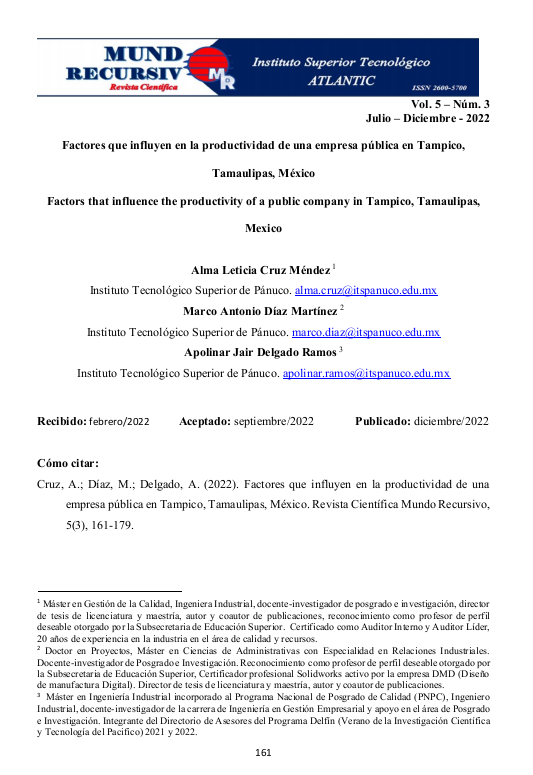Factors influencing the productivity of a public company in Tampico, Tamaulipas, México
Keywords:
Productivity, Social Responsibility, Working conditions and environment, Safety and health at workAbstract
The objective of this research is to analyze the factors that influence the productivity of a public non-profit electricity service company located in Tampico, Tamaulipas, Mexico; from the perspective of the company's most important resource: the staff. The measurement instrument consisted of a Likert scale questionnaire, the data was analyzed using the statistical program XLSTAT version 2014, the result of which showed that Social Responsibility has a positive impact on Productivity, while Conditions and work environment, Safety and health at work have a negative impact, concluding that company managers must consider the environment that surrounds the worker, maintaining a culture of commitment to society and the environment applied voluntarily throughout the organization will positively impact the environment internal, the performance of the personnel, consequently the productivity of the company and an external image of social responsibility.
References
Atmaja, N. P. C. D., & Puspitawati, N. M. D. (2018). Effect of physical work environment through productivity employees job satisfaction as an intervening variable. International Journal of Business, Economics and Law, 5(17), 98-104.
Busso, M., Longo, M., & Pérez, P. (2014). La estabilidad-inestabilidad laboral de jóvenes argentinos desde una perspectiva interdisciplinaria y longitudinal. Cuadernos de Economía. 33(63), 399-420.
Caballero, K. (2002). El concepto de “satisfacción en el trabajo” y su proyección en la enseñanza. Profesorado. Revista de Currículum y Formación de Profesorado, 6(1-2), 1-10.
Darren, G., & Mallery, P. (2003). SPSS for Windows step by step: A simple guide and reference. 11.0 update (4 ed.). Boston, MA: Allyn & Bacon.
Díaz-Martínez, M. A., Román-Salinas, R. V., Santiago-Santiago, A. D., Mejía-Barrios, C., & Zárate-Cruz, R. (2020). Industria 4.0 y la digitalización hacia la satisfacción laboral de las organizaciones en Tampico, Tamaulipas, México.
Estévez, A. H., & Estrada, M. G. A. (2021). Responsabilidad social empresarial en la misión, visión y valores de las principales empresas en México. Estudios Sociales: Revista de Alimentación Contemporánea y Desarrollo Regional, 31(57), 5. DOI: https://doi.org/10.24836/es.v31i57.1109
Herrera, T. J. F., Granadillo, E. J. D. L. H., & Gómez, J. M. (2018). La productividad y sus factores: incidencia en el mejoramiento organizacional. Dimensión empresarial, 16(1), 47-60. DOI: http://dx.doi.org/10.15665/rde.v15i2.1375
García, R. (2016). LA RESPONSABILIDAD SOCIAL Y SU IMPORTANCIA PARA EL FUTURO. GANAR-GANAR, 48.
Godas, L. (2005). Retribución de los empleados en la oficina de farmacia (II). Vol. 24 (5). P106-109
Jiménez, A., & Moyano, E. (2008). Factores laborales de equilibrio entre trabajo y familia: Medios para mejorar la calidad de vida. UNIVERSUM, 1(23), 116-133.
López, S., Chambel, M. J., Muñoz, F., & Silva, B. (2018). El rol de la percepción de apoyo organizacional en la inseguridad laboral y el desempeño. RAE-Revista de Administração de Empresas (Journal of Business Management), 393-401.
López-Roldán, P., & Fachelli, S. (2021). La encuesta.
Rodríguez, E. (2010). Protección de la seguridad y salud de los trabajadores. Una revisión desde la perspectiva global, latinoamericana y venezolana. 11(5). P81-96
Román, B. N., & Vargas, M. R. (2021). Innovación, Responsabilidad Social Empresarial en grandes empresas. Investigación Administrativa, 50(128), 1-19.
Neffa, J. C. (2015). Introducción al concepto de condiciones y medio ambiente de trabajo (CyMAT). Voces del Fénix, 6, 6-16.
Nicolaci, M. (2008). Condiciones y medio ambiente de trabajo (CyMAT). HOLOGRAMÁTICA, 2(8), 3-48.
Vargas, J. G. H. (2017). De la investigación en ciencias económicas administrativas a la elaboración de documentos científicos. Editorial: Fondo Editorial Universitario, México.
Vveinhardt, J., & Sroka, W. (2021). Independent Variables Affecting Employee Behaviour in Socially Responsible Organisations: Working Environment in Lithuania and Poland. Engineering Economics, 32(3), 266-277. DOI: https://doi.org/10.5755/j01.ee.32.3.28651










